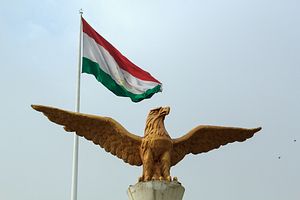Slowly, over months and years, the government of Tajikistan has been eroding the peace accord that ended the civil war. On September 4, a pair of attacks in and near Dushanbe set off a chain of accusations that have seemingly ended with the final closure of the country’s most prominent opposition party*. If the state is to be believed, a constellation of bogeymen connived to overthrow the government right under the defense ministry’s nose.
The Tajik Prosecutor-General’s office released an official statement today linking the Islamic Renaissance Party of Tajikistan (IRPT), its exiled leader Muhiddin Kabiri, and (until the day of the attacks) Deputy Defense Minister Abduhalim Nazarzoda. The statement says that Nazarzoda, on behalf of Kabiri and the IRPT, established 20 “small criminal groups” in recent years. The two attacks in early September–in Vahdat and Dushanbe–were preceded by an influx of “so-called charitable funds of foreign countries.”
Reading Tajik government narratives about what’s happening is like playing post-Soviet paranoia bingo. There are Islamic terrorists, warlords, conspiracies and foreign money.
But the IRPT aren’t terrorists. Even as legitimate opposition, the IRPT didn’t advocate radical change in Tajikistan. Holding only 2 seats (out of 63) after both the 2005 and 2010 parliamentary elections, they never posed a political threat to the government. The party, in the words of IWPR, “steadfastly pursued a moderate line and never aligned itself with radical groups present in Tajikistan.” As Eurasianet writes, Kabiri “pursued a liberal and accommodating line in relations with the government, drawing the criticism of those who believed he should have taken more hardline positions.”
Rather than an anti-government firebrand, in interview Kabiri comes across as having a reasonable and nuanced view on politics in Tajikistan. For example, in this interview with Fergana News in June he says:
I am not a supporter of looking at the government as if it were a single person. It is very diverse. I know there are a big number of quite smart guys, who do care about the nation. They are true patriots, but they are afraid. Nobody wants to stick out and be a white crow. We know what befalls those who express their opinion; therefore, experiencing the overall situation up there firsthand, they are forced to adapt to those realities. Therefore, we want to explain those who can influence the decision-makers that it is time to stop.
He foretells the party’s closure, but also expresses the hope that “common sense will prevail.” People, Kabiri said, “who look at the problem from a narrow viewpoint and believe closing the party will resolve all the problems—are wrong.”
Tajikistan’s challenges are many: economic downturn across the region has led to a massive drop in remittances on which Tajikistan’s GDP relies and chronic unemployment in Tajikistan means that returned migrant workers won’t have much more luck finding jobs at home than in Russia. Massive energy projects involving Tajikistan–such as the CASA-1000 project–are oriented to selling Tajik energy in South Asia, not providing a cure for the country’s own energy shortages.
The IRPT has little recourse at this point and the party leaders not already in exile are being rounded up by the authorities. The Prosecutor-General’s statement lists 13 IRPT members, labeling them as being involved in Nazarzoda’s 20 “small criminal groups.” Deputy chairman of the party, Saidumar Husayni, was arrested Wednesday at the Dushanbe airport and another deputy, Mahmadali Hait, was detained at his home.
Kabiri has pledged that the party will continue its activities “in accordance with laws and regulations of our country and countries we will be in.” He told RFE/RL “we will not go underground or start any radical activities,” but noted that the government has skillfully used Nazarzoda’s mutiny, “to reach their long goal at last, which is to depict us as radicals and extremists.”
*Correction: An earlier version of this article called the IRPT the “only real opposition party.” That is inaccurate, other opposition parties in Tajikistan include the Social Democratic Party and the Communist Party.































